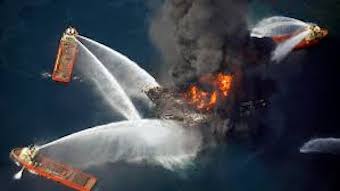By now, we’ve all heard scientists’ warnings that if we continue at the current pace, by 2050 there will be more plastic in the oceans than fish, if measured by weight. This statement isn’t hyperbole, it’s math. But it’s always made within the context of a discussion about plastics. So naturally we interpret it to mean that the rate at which we add plastic into the system is the primary driver. The equivalent of one truckload every minute, around the clock.
But what we usually miss is that plastic is only one of the two key variables in this equation. The other is the rate at which we are removing fish from the ecosystem. If anything, that factor is even more alarming. In fact, it turns out that commercial fishing does far more ecological damage than any other human activity on the seas. And that includes even pollution from major oil spills.
In 2010, the oil rig Deepwater Horizon exploded in the Gulf of Mexico, causing it to begin leaking oil from the seabed 1500 meters below. Over the following months, an estimated 4.9 million barrels (or about 780 million liters) had been lost from the ruptured well into the surrounding waters. Subsequent investigations were to reveal that negligence by British Petroleum (BP), the company that leased and operated the rig, was responsible for the largest oil spill ever seen in US waters, far surpassing the ½ million barrels from the Exxon Valdez spill in 1989. The loss of marine wildlife was appalling, including on the beaches as the oil slicks reached Gulf shores.
Enter Callum Roberts, a Professor of Marine Conservation in the Centre for Ecology and Conservation at the University of Exeter. His research focuses on threats to marine ecosystems and species, and what we can do to protect them. It turns out that the fishing industry in that same Gulf of Mexico destroys more wildlife in a day than this spill did over several months. This is not to minimize the impact of the spill, which was devastating, and whose effects we continue to feel to this day. It is simply to say that the seafood industry does far more damage than we normally care to acknowledge. Most of this is in the form of overfishing, bycatch of non-targeted species, and loss of life in discarded ‘ghost gear’.
It’s even been asserted by some in the scientific community that marine life in the Gulf actually benefitted from the spill because the possibility of oil contamination led to large areas being closed to fishing for periods of time. I haven’t found the data to quantify that or to establish it as fact, but it is interesting that such a proposition doesn’t sound crazy.
What all this should force us to recognize is that it isn’t simply accidents, unusual events, natural disasters or force majeure that we need to be concerned with. When it comes to living within the Earth’s planetary boundaries – which we must learn to do – it’s many of our everyday activities that cry out for a re-examination. Our very future as a species depends on it.
The old adage that there are plenty of fish in the sea is no longer true. Researchers like Roberts know that even with the advantages of boats filled with modern electronics and other technology, we land only about 6% of what we did 120 years ago. We can measure things like ‘landings per unit of fishing power’, and we find that we are down more than 100 times for haddock, and 500 times for halibut, for example. Of course this is compounded by climate change (e.g. warmer waters and increased ocean acidification), but it’s clear that we are overfishing currently available stocks at a rate which is nowhere near sustainable.
Why do we do it? In the simplest terms, because no individual fisher has an incentive to stop until everyone else does as well. Without a dramatic course correction, the end result will be a total collapse of every ocean fishery. Leading experts warn of ‘virtually empty oceans by 2048’ unless we change our ways, and soon.
To be clear, we are not talking about simply not being able to have seafood for dinner anymore. I can’t state this emphatically enough. All species are interconnected with each other and play a vital role in maintaining not only the biology, but even the very chemistry of the oceans and the atmosphere. Large numbers of fish moving up and down the water columns help circulate vital nutrients. Excretions from whales and other marine life are critical fertilizers for the phytoplankton that produce up to 85% of the planet’s oxygen. And so on.
Bottom line – removing all the fish from the ocean means upsetting the ecological balance so profoundly that we will have doomed ourselves to extinction. Again, that’s not hyperbole, it’s science and math.
So how do we stop catching fish at the rate of approximately 5 million / minute? Next week my colleague Anna will talk to us about how an often well-intentioned quest for food security via the use of fishing subsidies is encouraging destructive behavior on a global scale. Until then, if your circumstances allow it, remember to Skip the Seafood Aisle!
For The Orca’s Voice,
Chris, Canadian Cetacean Alliance



Leave a Reply